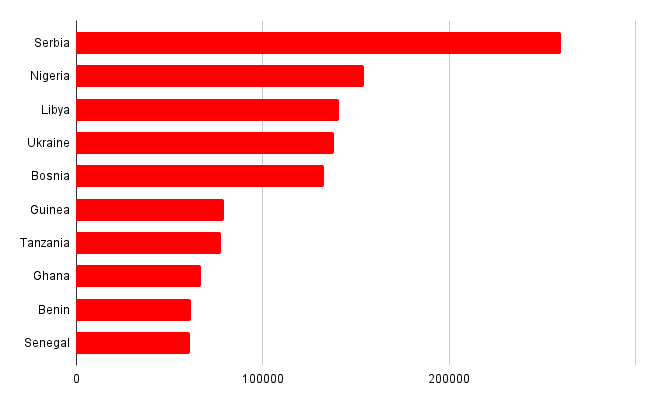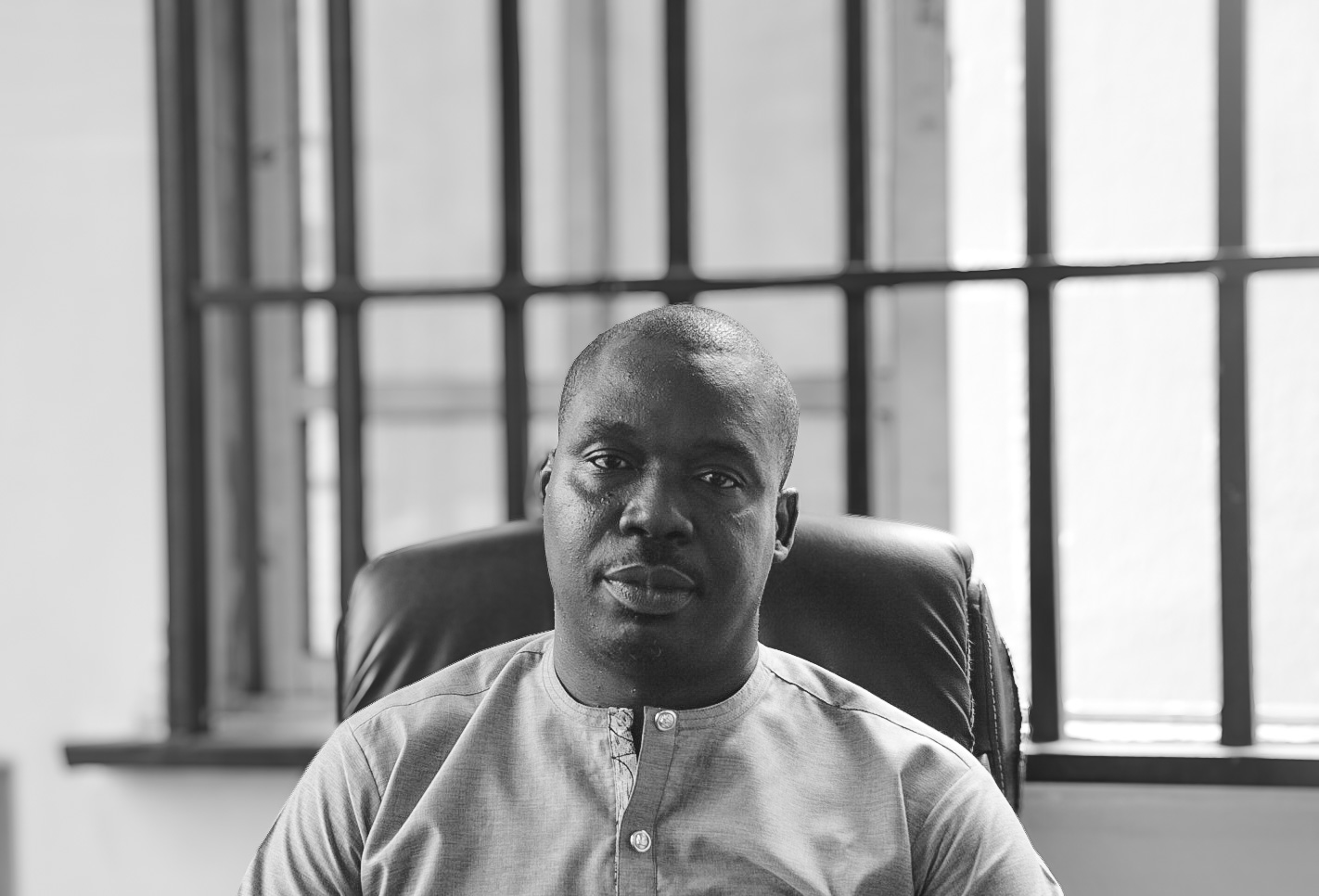Despite soaring inflation and a crumbling local currency, car dealer Precious Okoedion says no week goes by without a car sale at any one of his three dealerships across Lagos State, Nigeria. Okoedion says many of these sales—over 30 since 2023—have been facilitated through the auto tech platform, Carbin Africa.
Launched in 2023 by two ex-Cars45 employees, Femi Oriowo and Fawaz Abdul, Carbin Africa is digitising car inventory and sales processes for car merchants and dealerships in Lagos, Nigeria’s biggest car market.
Before joining Carbin Africa, Okoedion says he was just a “street trader working with Cars45,” where he first met and established a relationship with the Carbin Africa co-founders. Since joining the platform, a wide variety of merchants, dealers and their inventory have since opened up to him.
“A client will walk in here and say, okay, he wants [a Lexus] RS350, I don’t have it. I can quickly log into Carbin Africa and get what I want,” says Okoedion, in the Yaba outlet of his business, Okopi Auto Limited.
Beginnings
Oriowo’s path to founding Carbin Africa began when he was an OLX merchant serving as a middleman between Computer Village vendors and end buyers. He recalls passing by several car dealerships to and from the popular computer hardware market on the Lagos mainland, and thinking that selling cars on an online marketplace was not too far-fetched.
Once, buoyed by youthful courage, he entered into one of the dealerships and asked the owner if he could list the inventory on OLX and earn a commission.
“I was really confident in those days,” Oriowo says in his office in the heart of Yaba, Lagos’ famed tech cluster. The dealer agreed to the arrangement, providing him with photos and specifications of the inventory.
Within a week, he’d sold his first car, he said.
In a complete move towards car sales, Oriowo joined Cars45 after it launched in 2016 and built a merchant network with classmates from the University of Lagos where he was studying to become a geophysicist. He says they spread out at Cars45’s five retail centres across Lagos and he set up a corporate bank to process their sales centrally.
Then they “started to sell cars aggressively,” he says, at least 25 per month.
Eventually, because of the traction they had, Oriowo says he secured a 30-car monthly consignment deal from Cars45 management at the time. The deal was contracted on condition that he could find a physical lot for the consignment.
Together with his crew, the dealership initially operated from Abdul’s grandmother’s backyard before Cars45 offered to co-fund a proper car showroom. But before business could fully kick off there, COVID-19 lockdowns happened, followed closely by management changes at Cars45, summarily ending the agreement. Oriowo says they adapted by reducing inventory with the capital they had and partnering with dealers to sell their inventory for commissions—₦50,000 per car.
“They (dealers) really loved it because they only had to worry about buying the cars; they did not have to worry about selling,” Oriowo says.
It was this collaboration with dealers combined with previous experience working as merchants on Cars45 that revealed challenges and market gaps which ultimately led to Carbin’s founding, Oriowo says.
Unique selling point
Carbin Africa is one of several online platforms that have launched since 2010 to ease the buying and selling of cars in Nigeria.
To buy a car in Nigeria prior to 2010, you needed to visit any of several small and medium sized dealerships, or find listings in a newspaper, or attend a car auction, or know someone who had a car they were looking to sell. Marketplaces like Cheki—whose Ugandan and Kenyan operation Cars45 acquired in 2021, OLX, and Jiji facilitated the move online connecting anyone who wanted to buy or sell a car. Later startups like Cars45—which launched in 2016 and was acquired by Jiji in 2021—introduced, as its standout feature, verification and inspection services which were sorely needed in a low-trust market prone to fraud.
In Lagos, the car market relies heavily on middlemen, according to Richard Odoboh, one such middleman who has been using Carbin Africa since it launched. These middlemen, or auto merchants as Carbin refers to them, know where you can find a good Nigerian-used Toyota Camry or who deals in good UK-used vehicles—used vehicles, valued at an estimated $1.24 billion, comprise about 90% of the car market in Nigeria. In the best case scenario, they know how to verify the authenticity of car vehicles or where to avoid buying a car.
Their operations though, like your neighborhood tuck shops, are highly fragmented. It is unclear, for instance, how many of such middlemen there are exactly in Lagos. Oriowo says there’s likely around 10,000 across the country with a large percentage stationed most of the time in Lagos.
These middlemen or auto merchants are Carbin Africa’s prime target customers.
Oriowo argues that while end users might make a purchase, on average, once every few years, a middleman might sell two or three cars per month.
By bringing together car dealers—which Carbin Africa defines as established brick and mortar dealership with at least five cars in their inventory and a dedicated staff to interface with the startup—Carbin Africa makes available to the them a large variety of cars to trade in.
“I get cars from Carbin and then clients from Jiji,” Odoboh says, adding that he’s sold about 15-20 since joining the platform in 2023. He says he’s made as little as ₦50,000 and as high as ₦1 million in individual commissions.
The platform is also solving for what Oriowo says remains a challenge for middlemen or auto merchants who use existing marketplaces: obsolete listings and a sort of “nesting doll” problem where the same car can be listed by as many as three or four merchants or middlemen creating a lengthy provenance chain for end buyers and complicating sales processes.
So far, Carbin Africa has onboarded a little more than 250 Lagos car dealerships, across eight zone or dealership clusters, and generated a current digital inventory of about 1,700 cars—more than 90% of which are foreign- and Nigerian-used vehicles. There are around 1,000 middlemen registered on the platform and around 400 of them have facilitated a sale via the platform in recent months, Oriowo says.
He calls the platform the “largest real-time car inventory in Lagos,” with an update time of 30 minutes. A 2025 goal for the startup is to onboard at least 400 of the 500 car dealerships (by Carbin’s definition) he says there are in Lagos to increase inventory variety and volume for middlemen. Then the company will look to expand its reach to other used car market hot spots in Nigeria: Ibadan, Port Harcourt, Kano, and Kaduna.
The startup will also be considering a West African expansion down the road, he says.
Checks and balances
With transactions that run in the millions in a low trust environment like Nigeria, Carbin Africa’s VP of Products, Ogochukwu Nduka, says that there is an abundance of caution to keep all parties safe with every transaction.
Dealers and merchants, before they are activated, must provide information such as a National Identification Number or business registration documents from the Corporate Affairs Commission. Any one of its 20 field officers who are assigned to dealership clusters also physically verify these identification materials and confirm that dealerships are located where they say they are. In facilitating sales between an end user and a dealer, these officers also request and verify copies of identification documents from the buyer.
As they scale and improve digital verification, Oriowo says they will rely more and more on developing smart tech features and tools on the separate auto merchant and dealer platforms.
In addition to these online and offline verification processes, Nduka says sales are processed through Paystack ensuring transactions are secure until remitted to verified bank accounts.
Funding
So far, the startup has raised $300,000 in pre-seed funding from early-stage venture capital firm, 54Collective. The firm says its investment stemmed not only from the co-founders’ “deep industry expertise,” but their understanding of the market, in line with its founder-forward investment model.
“At 54Collective, we’re extremely bullish on the automotive value chain across both East and West Africa. Our confidence extends to both core infrastructure and complementary solutions in this sector, which made this investment align well with our strategic vision,” Yunus Ibrahim, Junior Venture Builder at 54 Collective said in an email.
As the company grows, the firm stays tracking several growth metrics, from the number of auto merchants actively using the platform and the growth of its car inventory, to activation and retention rates.
The venture firm is leading a pre-seed extension round, according to Oriowo.
Ibrahim says the firm will continue to support the startup “provided they maintain strong performance against our key metrics.”
Revenue model
In addition to receiving commissions on every transaction it facilitates, Carbin Africa, like other players in the sector, earns money by providing services such as car document verification to its auto merchants and dealers. This it does through a partnership with vehicle verification service, LegitCars.
While Okoedion says it is a service he’s used for car sales facilitated through the platform, auto merchant Odoboh says it is not a service he’s aware of or has used. He carries out car verifications the way most middlemen do; through personal contacts at customs and law enforcement.
Car financing is another area it is venturing into. It is not a new service for startups in the auto tech sector, but Oriowo says that Carbin’s financing product, Car Flex, targets middlemen who are underserved in the current market. Merchants, he says, have domain knowledge. They know where to find good deals, network, prospect and make sales. Yet, many are unable to grow beyond serving as middlemen for lack of capital.
“The only difference between a freelancer (merchant) and a standard car dealership is just money,” Oriowo says.
The startup has been in conversation with credit institutions and investors for this financing product and Oriowo says there’s already commitment from three local and international backers.
Oriowo says in 2024, the company crossed around ₦1 billion in Gross Merchandise Volume—they’re declining to disclose gross profit numbers. In 2025, the company plans to reach or surpass ₦5 billion with a 10% take rate.
Ololade Shoyemi, Carbin Africa’s VP of Operations & Growth, says it is an audacious goal but the structure and partnerships to make it happen are already in place.
Carbin Africa has entered a sector with strong indirect competitors like Jiji (which now owns Cars45) in spite of its specialisation and unique offerings. Perhaps, more directly competing with the startup include Shekel Mobility, a YC-backed startup which launched in 2022 and offers financing as well as operations management to car dealers, which they may define differently than Carbin Africa.
Oriowo says he likes to think of old and new startups in the sector as less of competitors and more of collaborators especially given the size of the car market. In fact, the more players there are, the better the outcome for different segments of the market that need the solutions they bring, he argues. This year, however, the one-year old startup is shooting for the moon. Perhaps, if their ambitious plans come to fruition, they might land on the stars instead, he says.




